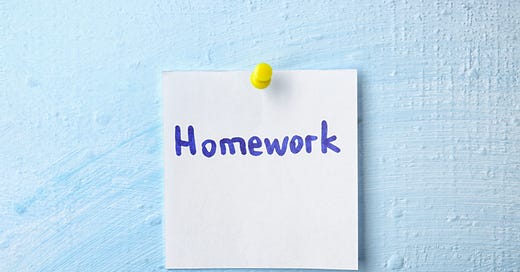How Dare I Ask for Homework in a Pandemic?!
Homework can be a touchy subject but this was a bit much.

The debates over homework are nothing new. One parent wants their children to be responsible for completing something each night and another thinks of homework as useless busy work. I like the routines and accountability that homework requires— kids learn to budget their time and perhaps delay their gratification. A bit of vocabulary practice, a few math problems, a writing prompt—how is any of that bad? I’m not expecting them to research a write a weekly dissertation.
A night off here and there is no big deal but when my 8th grader barely has any homework after having his live instruction cut by more than half, it seems a benign request. No?
Well, not to the teachers who think homework is bad, unnecessary and puts a student’s well-being at risk. And with more and more teacher training programs shifting to an anti-homework philosophy, telling their aspiring teachers not to assign it, parents who want their kids to have homework can find themselves fighting an uphill battle.
It started out in good fun. At least I thought so.


One teacher responded in a way that made total sense.



Then, predictably, the insults and over-the-top rhetoric of absurd binaries started. Like, you can’t be a caring teacher AND assign homework during a pandemic.

I do not know this person and she does not know any of my children. But she now knows what his teacher and what he needs. She kindly shows her concern over his social emotional health by using the hashtag #SELfirst. She has decided that social-emotional learning should come first, ahead of any academic homework I may be wishing he had.
She also reveals that homework, in her mind, can’t involve lifelong skills, creativity, curiosity or critical thinking. Does she think he’s getting that from the other stuff he chooses to do with all his down time? He only goes into school two days a week and is done with his “independent tasks” on his off days by 11:30 am. With his football season cancelled and basketball on the chopping block, what exactly does she want him doing with all these extra hours? Going for a hike and collecting leaves? Building a go-cart out of PVC pipe? She does not know him. I do. And I know higher expectations regarding school work would help him during this time.
I am his mother.


Here is where I get my hackles up. I have no problem with her suggestions about reading, building, playing and creating. My kids get a lot of “play” time but I wish they were expected, by their teachers, to read more. Having a teacher require it is far more effective than mom pushing it at home—and that is often how it is parents who don’t have kids who choose to read in their free time. If he knows he has to read a few chapters for school each night, he will do it. I’m asking for that push. That’s all.
But this whole idea that a teacher believes it to be a universal truth that students “need time to heal their minds from the fear of the world they are living in” is beyond the pale for me. This trend of instilling fear in children—other people’s children—is out of bounds and in some cases, lands squarely in the category of abuse. I am not accusing this particular teacher of that since I do not know how she is with her own students but this response to me, over a request for homework, sends up a red flag for me.
Do people not realize that when virtually all sports and extra-curricular activities are cancelled, kids have time to “heal their minds” if needed and do some homework? I’m not asking for 5 hours of intense research — I’m asking for a current event, a writing prompt, a chapter or two of reading.

This piece was edited an hour or so after publication to add Mr. Buck’s contributions to the conversation.




I gather from perusing your content, that you are a working mother, of at least a middle schooler and maybe younger kids? But I want to strongly recommend a book that will explain a lot about education in America (and it's on audio conveniently): The Knowledge Gap by Natalie Wexler.
This book focuses on elementary school, but it elucidates the foundational beliefs and practices of teachers in our country about knowledge and learning. Homework is not discussed in the book, but here's what I surmise: there is current research which shows homework to be ineffective. And it is ineffective, because their pedagogy and practices are very ineffective. Adding another hour of reading comprehension strategies after school doesn't make a difference, but the two hours they do every morning in elementary school also doesn't make a difference.
Then go to forums.welltrainedmind.com and investigate curriculum recommendations for "after schooling." There's a whole mess of people willing to help with recommendations!